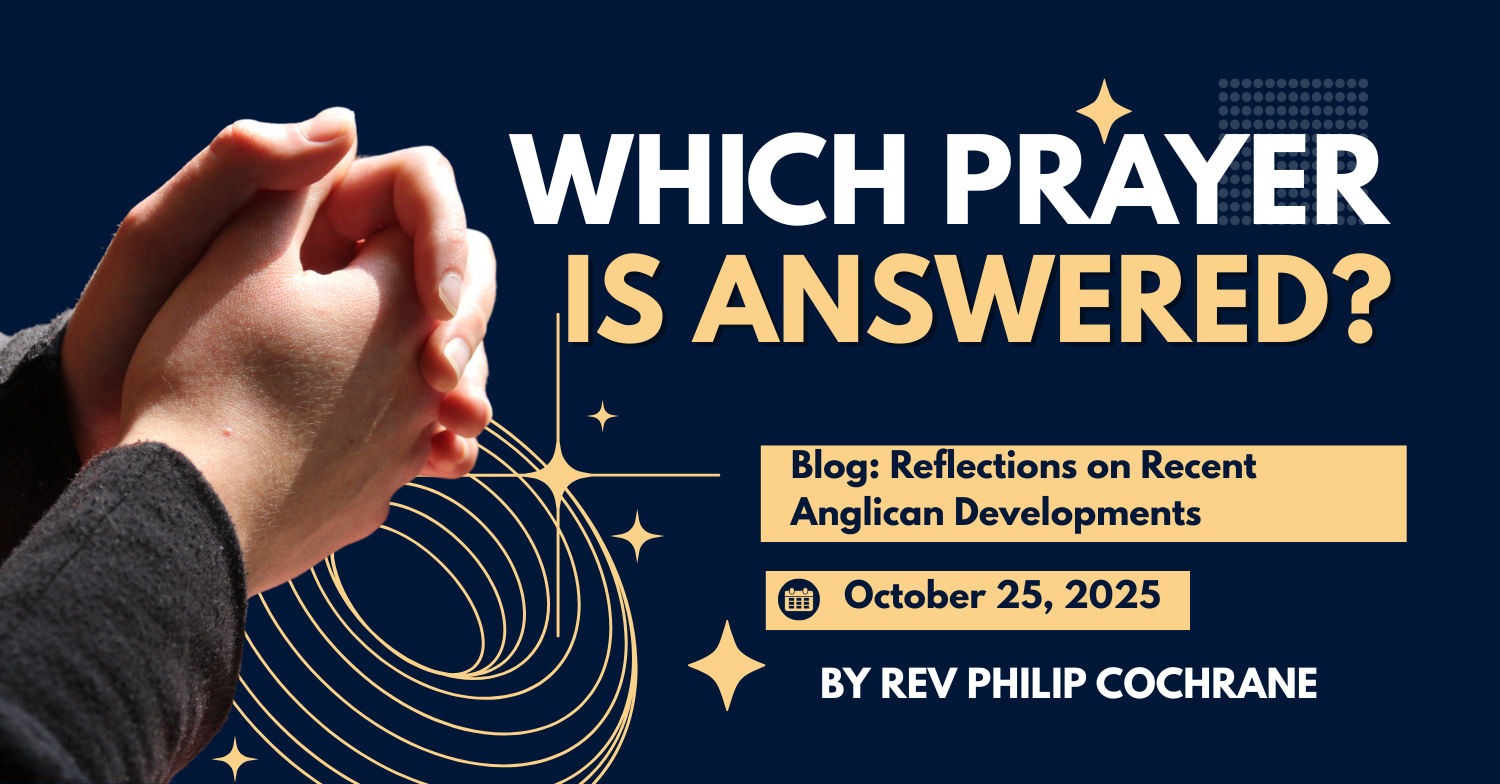
Which Prayer Gets Answered?
Reflections on Recent Anglican Developments
By the Rev. Philip Cochrane, Rector of St Laurence Anglican Church, Coquitlam
Posted October 25 2025
Introduction
In recent weeks, the Anglican Communion has been shaken by two significant developments. The Church of England has effectively ended Living in Love and Faith - a five-year process of teaching, listening, and discernment around identity, sexuality, relationships, and marriage - and leaders of GAFCON have announced plans to form a rival Anglican network outside the Communion.
These events may seem distant, yet they touch us deeply here at St Laurence. They raise questions about belonging, identity, and the witness of the Church in our time.
This Sunday’s Gospel (Luke 18:9–14) offers a striking lens: a Pharisee prays, “God, I thank you that I am not like other people,” while a tax collector simply pleads, “God, have mercy on me, a sinner.” The Pharisee claims authority; the tax collector knows his need of grace. Jesus’ verdict is clear - the outsider goes home justified.
It is an uncomfortable story when we consider who now claims to be the true Anglicans, and who bears the cost of exclusion.
The Personal Dimension
For many 2SLGBTQIA+ Christians, the end of Living in Love and Faith feels like bereavement and a betrayal. Years of testimony and patient engagement have not led to recognition or inclusion. Instead, many feel unseen and exhausted.
This morning I head to our cathedral with other clergy to meet the Very Rev. David Monteith, Dean of Canterbury Cathedral, who is visiting our diocese. David and I share similarities — both from Northern Ireland, roughly the same age, and both gay clergy in the Anglican Communion. He has written powerfully about what this moment means for 2SLGBTQIA+ people in ministry - the invisibility, the broken promises, the exhaustion of always being gracious while absorbing violence. [Read his reflection here]
I have been reflecting on my own journey. I left the Church of England to come to Canada, partly because - as my youngest son once put it - “they keep throwing you under the bus.” I sometimes wonder: Did I give up too soon? Yet leaving allowed me to serve in a church where I can be fully myself, where my marriage is celebrated, and where I no longer calculate what’s safe to say or who’s safe to be around. I am SO grateful.
This grief is not theoretical; it is lived experience of exclusion in the church many have given their lives to serve.
The Communion Dimension
The announcement from GAFCON signals a deepening fracture within the Communion. As their declaration puts it:
“We have not left the Anglican Communion; we are the Anglican Communion.”
They claim that churches like ours, which affirm 2SLGBTQIA+ Christians, have “abandoned the Scriptures.”
This raises profound questions:
-
Who decides what faithful biblical interpretation looks like?
-
Why is sexuality elevated above other gospel concerns - reconciliation after genocide, climate justice, economic exploitation, care for the vulnerable?
-
Whose voices are silenced when one group claims exclusive authority to speak for God?
For many, this feels like the tearing of a family fabric and raises painful questions about our shared future.
Our Local Context
Closer to home, I'm aware that 2SLGBTQIA+ people in the Tri-Cities often have difficulty finding church communities where they can be fully themselves, welcomed in both membership and leadership. Churches across our region are at different places in their theological discernment on these questions-some are wrestling deeply, some have reached different conclusions than we have. I name this not to condemn but because the pastoral reality is urgent: people are searching for spiritual homes and not finding them.
For every person who finds St Laurence, how many quietly give up the search? How many conclude that church simply isn't for them?
This makes our witness vital. We must be visible, intentional, and unapologetic in our welcome - not as a political statement, but as gospel faithfulness. We want those who are searching to know that they will be seen, valued, and loved.
A Pastoral Response
So what can we do?
-
Be a community of hospitality, where all are welcomed at Christ’s table.
-
Stand in solidarity with those who feel excluded, through visible witness as well as words.
-
Pray for the wider Church, trusting that the Spirit may yet bring healing and renewal.
I also hold in prayer those who, like me, have had to make hard choices - to stay and resist, or to leave and seek places of flourishing. Both paths require courage and involve loss.
Theological Anchor
At the heart of our faith is the conviction that Christ gathers the outcast, heals the broken, and makes of us one body.
The Eucharist we share each week is not a sign of institutional unity but a sacrament of grace that transcends our divisions. In Christ, we are held together, even when church structures falter.
Conclusion
These are uncertain times for the Anglican Communion and painful times for many within it. Yet our vocation at St Laurence remains steady: to be a community of welcome, justice, and hope.
May our life together bear witness to the love of Christ that knows no boundaries — and may our visibility be a beacon for all who seek a home.
A Collect for those who wish to pray:
Holy One,
whose love knows no boundaries and whose welcome has no end,
gather us as your people even when we are scattered,
heal us when we are wounded,
and make us one body in Christ,
where every gift is honoured and every voice is heard.
Grant that our community may be a beacon of hope and hospitality,
so that all who seek belonging may find a home in you;
through Jesus Christ, our companion and guide,
who lives and reigns with you and the Spirit of life,
one God, now and always. Amen.
